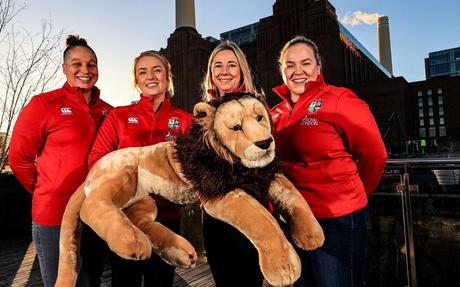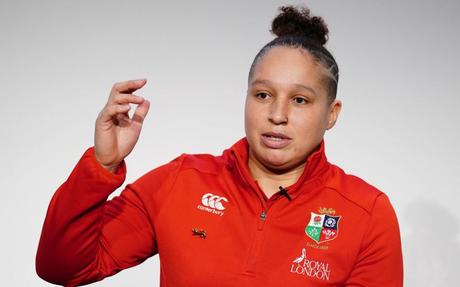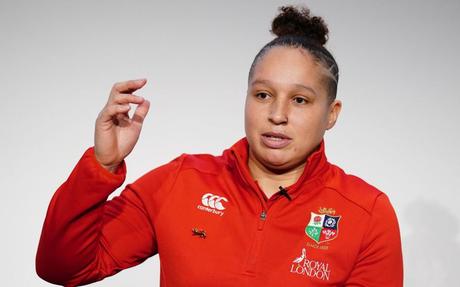
The British & Irish Lions have announced that a first women's team will tour New Zealand in September 2027.
The team will play three Tests against the Black Ferns, the reigning world champions, as well as five warm-up matches in New Zealand, which are expected to be against provincial sides.
The confirmation of a first-ever women's team marks a new chapter in the Lions' 136-year history, which CEO Ben Calveley called a "historic milestone" for women's football, warning it would not simply be a copy-and-paste version of men's tours.
"What we're not going to do is simply repeat what happens in the men's game," Calveley said. "This is potentially very different. We see ourselves going to many different locations in the future.
"You could see France being very interesting for a women's Lions tour in the future, just like in North America - they are hosting the men's and women's World Cups in 2031 and 2033.


"The page is blank and we can take ourselves anywhere provided it is good for the growth of the women's game."
Significantly, no international quota will be imposed on a women's team, which would follow the same merit-based selection process as for the men's Lions teams.
There were fears that England players would dominate a women's Lions team as the Red Roses have been the most successful home side on the female Test scene in recent years, having won the last four Six Nations titles.
Organizers insist the women's team will be commercially sustainable as they have already secured two commercial partners to support the 2027 tour. Royal London, the Lions' global partner, will act as founding partner of the women's team, while insurance company Howden has been confirmed as title partner for the first series.
The money invested by Royal London will be invested directly into player pathways in each of the home unions to support the continued wider growth of the women's game.
The story continues
"We are very clear that we are just one part of the global rugby ecosystem and that we are now a whole new part of the women's game. We wanted to make sure we were making decisions that were in the best interest of the world. Lions, but also in the interests of the women's game," said Calveley.
The development follows months of work by the Women's Lions feasibility steering group - made up of professional rugby executives, business executives and former players - which concluded last year that a tour would be commercially sustainable.
The most important questions
Why New Zealand?
Simply put, the Black Ferns are the queens of women's rugby. In reality, they are one of only two rugby nations, alongside France, that would be a competitive opponent for a women's Lions team. The British & Irish Lions are also inspired by the country's record-breaking World Cup in 2022, which retrospectively served as a blueprint for the 2027 tour.
"These matches will be hyper-competitive, but we also expect them to bring sell-out crowds so we will have passionate fans in packed stadiums," Lions CEO Ben Calveley said. "There will be a large media footprint, a large interest from broadcasters and so on. And very importantly, it is commercially sustainable, not only for the Lions but also for the host of New Zealand Rugby."
Where will future tours go?
While New Zealand was the "unanimous" choice for the 2027 tour, France and North America have been touted as possible hosts for future women's tours, which would deviate from the traditional tourist locations in the men's game.
"We have spoken to many different countries around the world, as you would expect, and the good news is there has been a lot of interest," said Calveley, who kept abreast of what other countries were raising as part of the long-term plans . "New Zealand are back-to-back world champions and such a rugby-loving nation that the level of competition for 2027 would be significant."
Won't it be full of English players?
The short answer is yes. While the women's rugby landscape could change over the next three years, it is difficult to imagine the first women's Lions team being truly representative of each of the home nations. England, who will be heavy favorites to win the Women's Six Nations for the fifth time in a row this year, were the first women's team to benefit from professional contracts five years ago. Wales, Scotland and Ireland have been slow to follow suit, although there now a large contingent of non-English players could soon switch their club rugby playing to England's top flight, Premiership Women's Rugby.
Who pays for it?
Money is often a sticking point in women's rugby, which largely operates at a loss compared to the riches awash in the men's game. For context, the Red Roses' historic Grand Slam final at Twickenham last year, which attracted a crowd of 58,498 in May, raised Rugby Football Union around £1 million. However, Calveley has promised that the 2027 women's tour will be a commercially sustainable venture, having already secured two commercial partners in Royal London and Howden.
What are the next steps?
The Lions will put together an advisory group that will be tasked with mapping out the finer details for the 2027 tour, including what the warm-up matches will be, recruiting a coaching team and what the TV coverage will look like. "We know we are playing three Tests against the Black Ferns, but the remainder of the program will be determined and, crucially, constructed in accordance with women's specific player load guidelines currently being worked on by World Rugby and the International Rugby Players' Association," Calveley explains.
What does this mean for the wider women's game?
Being selected to play for the first women's Lions team could be the highlight of some players' careers. The Lions brand undoubtedly exudes prestige and its - some believe it was too late - entry into the women's game should draw more attention to women's rugby. But the idea of the world's best homegrown players taking on six-time world champions New Zealand will do little to develop the competitive landscape of women's football. In fact, the concept could hardly be further away from what World Rugby is trying to achieve through WXV, the global women's league launched last autumn to give developing countries more testing opportunities on the women's field.
